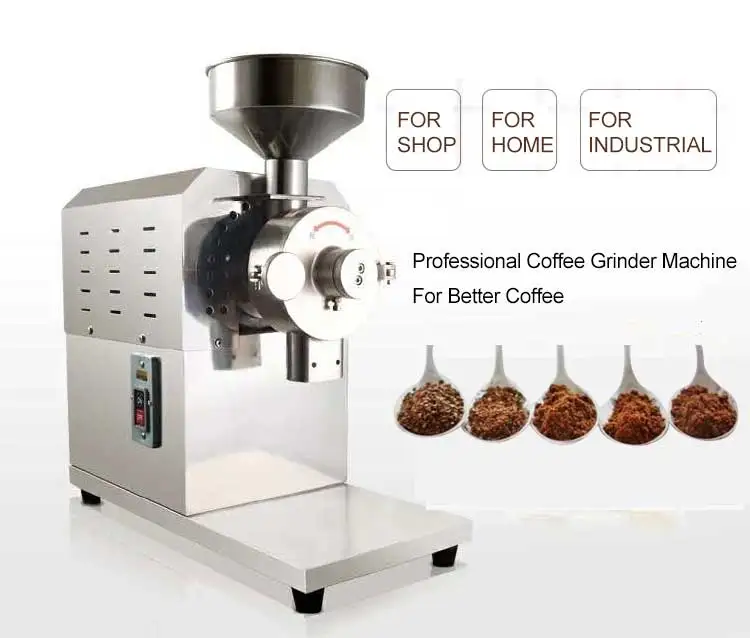Top Reasons Every Café Requires an Industrial Coffee Grinder
Top Reasons Every Café Requires an Industrial Coffee Grinder
Blog Article
Industrial Coffee Grinder Overview: Boost Effectiveness and Quality
In the affordable landscape of coffee manufacturing, selecting the right commercial coffee mill plays a critical duty in boosting both performance and item top quality. Recognizing the subtleties of different grinder kinds and vital attributes-- such as personalized grind setups and robust building and construction-- can substantially affect the final flavor account of the coffee. Moreover, the optimization of the grinding procedure, coupled with persistent upkeep, is essential for sustaining efficiency with time. As we discover these critical components, it ends up being noticeable that the ramifications prolong past simple devices choice, influencing general company success in manner ins which warrant closer assessment.
Comprehending Grinder Types
When choosing an industrial coffee mill, recognizing the numerous kinds available is essential for enhancing both taste removal and functional performance. The two primary sorts of mills are blade grinders and burr mills. Blade grinders make use of sharp blades that slice coffee beans right into irregular sizes, bring about uneven extraction and potentially unfavorable flavors. While blade grinders are usually extra budget friendly and ideal for small-scale operations, they are typically not suggested for commercial usage.

Eventually, picking the best sort of mill is indispensable to maintaining quality and performance in coffee production, making it important for organizations to purchase top notch burr mills for optimum results.
Key Functions to Take Into Consideration
Picking a commercial coffee mill needs careful factor to consider of several essential attributes that can dramatically influence both efficiency and the total coffee experience. Among the main facets to evaluate is the grinding mechanism. Burr grinders are generally chosen over blade grinders, as they offer a regular grind size, which is critical for optimal removal and taste.
One more important attribute is the mill's capacity. A functional mill with several settings allows you to customize the work size to different developing methods, enhancing the coffee's taste account.
Evaluate the grinder's sound degree, specifically in an active café or manufacturing setting, where extreme sound can be disruptive. Investing in a grinder that stabilizes these attributes can substantially enhance both functional performance and the high quality of the coffee offered.
Optimizing Grinding Refine
To attain the ideal results in coffee prep work, optimizing the grinding procedure is essential. The work size dramatically affects removal, taste, and total top quality of the brewed coffee.


Additionally, monitoring the grinding speed can enhance the procedure. Slower grinding commonly creates less heat, protecting delicate flavors and fragrances. On the other hand, faster grinding might produce excessive warm, negatively influencing the coffee's top quality.
Upkeep and Care Tips
Appropriate maintenance and treatment of commercial coffee mills are crucial for making sure ideal efficiency and longevity. Routine cleaning is the foundation of upkeep; deposit build-up can influence flavor and grinding efficiency. It is suggested to clean up the mill after each usage, cleaning down the outside and getting rid of any type of coffee grounds from the burrs.
In addition, examine the grinding burrs for wear and tear. Boring burrs can jeopardize work uniformity, so they must be replaced as required. Industrial Coffee Grinder. Periodically calibrating the grinder is additionally important, as this preserves the desired grind dimension for different developing methods
Lubrication of relocating parts must be executed according to the producer's requirements, as this decreases friction and prolongs website here the life of the equipment. It is necessary to utilize food-grade lubricating substances to make sure safety and security and conformity with health and wellness guidelines.
Lastly, maintain the grinder in a secure and dry environment to avoid rust and rust. By sticking to these upkeep and treatment pointers, operators can improve the efficiency of their commercial coffee grinders while guaranteeing high-grade output and expanded functional life.
Return on Financial Investment Evaluation
Reviewing the roi (ROI) for industrial coffee grinders is essential for businesses seeking to enhance their coffee production abilities. A comprehensive ROI evaluation helps identify the monetary feasibility of purchasing high-grade mills, enabling services to evaluate the first prices against prospective gains.
To perform a thorough ROI analysis, organizations must consider a number of vital elements. Initially, evaluate the acquisition price of the mill, including installation and any type of needed modifications to existing facilities. Next off, calculate operational costs, consisting of power intake, upkeep expenses, and labor performance enhancements. High-performance mills usually lead to decreased grinding time and boosted throughput, which can substantially enhance productivity.
Additionally, think about the influence on item high quality. Industrial Coffee Grinder. Superior mills produce a more consistent work dimension, which can improve flavor accounts and client contentment, inevitably driving sales. By boosting the top quality of the final product, businesses can validate greater prices, leading to raised profits
Final Thought
In summary, a commercial coffee mill plays a critical role in improving both efficiency and item high quality within coffee manufacturing. Eventually, the strategic financial investment in a trusted websites mill contributes substantially to boosted earnings and competitiveness in the coffee sector.
In the affordable YOURURL.com landscape of coffee production, picking the ideal commercial coffee grinder plays a crucial role in improving both effectiveness and product top quality. The two primary kinds of mills are blade mills and burr mills. Within the burr grinder classification, there are level burr grinders and cone-shaped burr grinders, each with its benefits. Burr mills are typically chosen over blade mills, as they provide a regular grind dimension, which is critical for ideal extraction and flavor.
In recap, an industrial coffee mill plays an essential function in boosting both performance and item top quality within coffee production.
Report this page